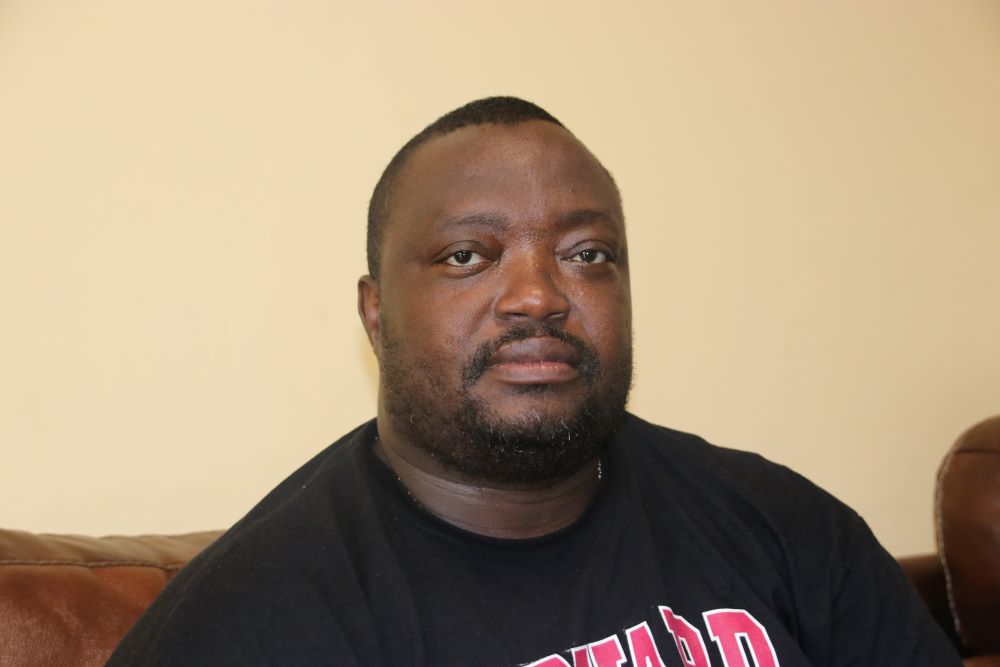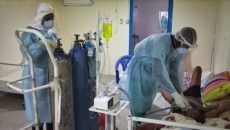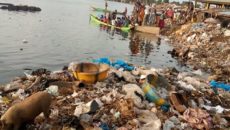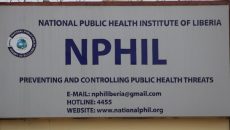MONROVIA, Montserrado – On April 17, 2020, Nathaniel Blama, Liberia’s first confirmed case of the Coronavirus, was discharged from the 14 Military Hospital after completing treatment for COVID-19 and being certificated by health authorities.
Blama, the executive director of the Environmental Protection Agency, had returned from Switzerland from a conference on March 13 and tested positive for COVID-19 on March 16. The next day, President George Weah addressed the nation, where he announced the first case.
In a press statement later issued on the Executive Mansion website, the president also announced he was suspending Blama for refusing to adhere to health protocols when he arrived at the Roberts International Airport.
While at the treatment facility, Blama tested negative after 14 days of isolation. Usually, after a patient is tested negative for COVID-19, they are released to return to their families and community, but Blama was again isolated for an additional 14 days out of an abundance of caution from health authorities.
Blama’s discharge followed 26 days at the treatment facility without any signs and symptoms of the virus.
The Bush Chicken met with Blama to hear his side of the story. At his Cabral Estate residence on the Old Road, two well-armed security officers stood on duty.
Testing Positive for COVID-19
A very relaxed Blama said he had traveled to Switzerland on March 8 and arrived there on March 9. At that time, Switzerland had recorded 374 cases and 2 deaths. Blama said he returned to Liberia on March 13. A day later, he said he started feeling ill and decided to take some medications and stay home.
On Sunday, March 15, Blama said he reached out to some health officials, including Dr. Jerry Brown of the John F. Kennedy Medical Hospital, who was in Brazzaville, Congo at the time.
“After my return from Europe, I asked Brown if we had testing capacity in the country because I was not feeling well,†Blama said.
Brown linked Blama with Dr. Francis Kateh, Liberia’s chief medical officer, and Dr. Mosoka Fallah, the executive director of the National Public Health Institute of Liberia. Blama said specimen was collected from him on March 15, analyzed on March 16, and he was informed he was positive of the Coronavirus.
On the first day when he was taken to Redemption Hospital, Blama said all the nurses were afraid to get close to him for fear that they too would contract the disease.
“I inquired from the health authorities about the next step and was informed that I [would] be taken into isolation and agreed to be taken to the 14 Military Hospital,†he said.
Quizzed about how he contracted the disease, Blama said he could not pinpoint when it happened. However, he posited that he may have come in contact with someone who was asymptomatic.
“Coronavirus is like a flying bullet and you never see the bullet until it hits you and when you feel it, you realize being hit by a stray bullet,†he said.
However, when Blama left Switzerland, the European country had recorded 7 deaths and 1,009 cases.
The Green Climate Fund board meeting that Blama attended in Geneva had reportedly been moved from South Korea to Switzerland instead of being held online. At the meeting, a board member from France said there had been proposals to hold the meeting online, but some board members objected. Cyril Rousseau said he thought the decision to have a physical meeting was irresponsible: “We are at risk of introducing the virus in countries where that can put some strain on their health systems.â€
As predicted, the meeting allowed the virus to be brought to Liberia through Blama. For the executive director of the EPA, being diagnosed with COVID-19 was an emotional experience.
“There were mixed emotions and a sad moment, most especially, when family and friends learned about my situation,†he said. “They called and wept on the phone and I felt how downhearted they were, but I had to be strong.â€
“One of my neighbors fainted upon hearing that I had contracted the disease,†Blama added, noting that he felt he had to comfort his friends and family and assure them that he would be fine.
He recounted changes in his mood as he dealt with the news of having COVID-19, especially in being the first person in Liberia to have the disease. The World Health Organization has warned that there would be increased levels of loneliness, depression, and self-harm or suicidal behavior during the pandemic.
However, Blama said he also received support from all over the world, and that helped him power through the disease.

A view of Nathaniel Blama’s residence. Photo: Zeze Ballah
Experience at the Precautionary Observation Center
While in isolation, Blama said he was kept in a hospital room and was not completely disconnected from the world. Although he said there were social distancing measures put in place, he could communicate by phone and make video calls with family members and friends.
Some workmates and friends even brought gifts to the facility for him.
“I was not really bored,†he said. “It was a time of reflection at the POC because getting away from your normal life is something completely new.â€
Blama’s Twitter account, which had been dormant since January, suddenly had new posts, beginning on March 25, when he wrote, “Lord you know everything I’ve done, every thought I’ve had, you know every one I, and Lord you know every time I fall still you come to my rescue when I call.â€
Every day, at around 6 a.m., Blama’s Twitter account had a reflective religious post that was well received by followers of his account, who would offer their prayers or a simple “Amen.â€
Blama said being in the observation center was relaxing once he was no longer being treated. He described it as a resort, with a gym, swimming pool, and self-contained apartments with living rooms and kitchens.
“I told people that I have not taken [a] vacation for a long time and my relaxation at the hospital was my vacation in the country,†he noted.
He recounted waking up each morning at 6:00 a.m., going to the gym, and then watching the news afterward. Between 8-9:00 a.m., the nurses would stop by to provide the prescribed medication. Blama was especially appreciative of the nurses and doctors who worked with him during his difficult moments.
Stigma, Myths, and Misinformation
Despite COVID-19 being a global pandemic, Blama says he is surprised that many Liberians doubt that the virus is in Liberia. He said there are videos online where some people are even accusing him of collaborating with the president to bring the disease to Liberia.
Worse, he recalled being shocked when a friend he holds in high esteem doubted the existence of the virus.
“Misinformation is one of the greatest threats facing the country in the wake of the fight against the virus,†Blama said.
He found it ludicrous that people believe he would travel to another country only to contract the virus and bring it back to Liberia.
“I will never risk my life for something of such, I was a victim of a global public health menace,†he said.
He worries that these rumors may make it difficult for people to want to turn themselves to health authorities when they show symptoms of the virus.
“There are lots of myths and conspiracy theories permeating the corridors of the country surrounding COVID-19, and my fear is about the possible negative impact the misinformation may have on the public,†he said.
“Some of the rumors I heard about myself were unbelievable, but this is Liberia.â€
He recognized the need for better awareness from health officials: “The government needs to change the paradigm and mindset of Liberians by creating more awareness on COVID-19 because there are too many lies being spread around.â€
If the virus could so easily overwhelm countries with much better health systems than Liberia, Blama said Liberia needed to be on its guard.
As for the stigma associated with being the first person to contract the disease and sometimes being called “Mr. Coronavirus,†Blama said, as a public figure, he owed it to disclose his identity to the public to ensure that others were on guard.
“I had to choose to disclose even though I knew I was risking being stigmatized,†he said. “I did not commit any crime by contracting the disease and will not hide myself from the public.â€
Now home, Blama says he is excited to have left the isolation center.
“No matter where you go, there is nowhere like home. The comfort in your home is different from the one anywhere,†he said.
“When I was discharged on April 17 and returned home, my neighbors and friends came from all walks of life to greet me and they rejoice over my discharged.â€
Blama attributes his success in battling the disease to his faith: “I recovered and was discharged because of God’s favor. He wanted me to tell my story to the world.â€
Featured photo by Zeze Ballah



